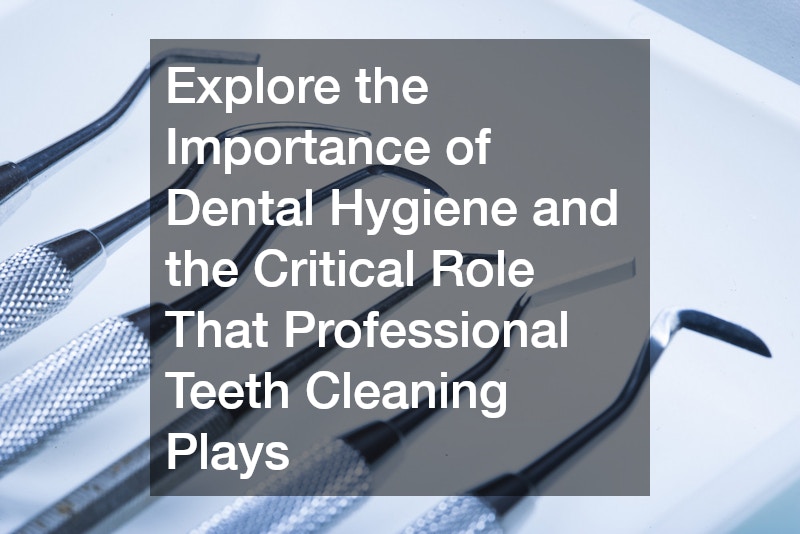Explore the importance of dental hygiene and the critical role that professional teeth cleaning plays in maintaining overall oral health. Maintaining optimal oral hygiene is not only essential for a beautiful smile but is also crucial for preventing serious health issues. Professional teeth cleanings act as a preventative measure and support our daily oral care routines in ways that personal effort alone cannot achieve.
What are the Benefits of Regular Teeth Cleaning?
Prevention of Oral Diseases
Regular professional cleanings significantly reduce the risk of developing common dental issues such as cavities, gum disease, and tooth decay. By effectively removing plaque and tartar buildup that contributes to these conditions, professional cleanings can maintain the health of your teeth and gums.
Regular visits to the dentist ensure that any potential issues are identified and addressed early on, preventing more severe problems down the line.
In addition to preventing oral diseases, professional cleanings can enhance your immune response. When oral health is compromised, bacteria can enter your bloodstream, potentially leading to systemic infections or exacerbating existing conditions such as diabetes. By maintaining regular cleaning schedules, your oral and overall health will benefit significantly, reducing the risk of complications.
Furthermore, professional dental cleanings can prevent the onset of periodontal disease, a severe gum infection that damages the soft tissue and bone supporting the teeth. Without intervention, periodontal disease can lead to tooth loss. Regular cleanings help to disrupt the progress of the disease, protecting both your teeth and overall health.
Enhancing Oral Hygiene
Professional teeth cleanings complement and enhance your daily brushing and flossing routines. Even the most diligent oral care practices at home can fall short of effectively reaching all areas of the mouth. Dentists have the tools and expertise to access hard-to-reach areas, ensuring a comprehensive cleaning process.
With the assistance of a dental professional, areas that are often missed during regular brushing can be targeted and cleaned thoroughly. This comprehensive approach not only removes plaque and tartar buildup but also promotes more effective personal oral care practices by educating patients about problem areas and teaching proper techniques.
Moreover, professional cleanings can help strengthen your teeth, providing them with fluoride treatments that reduce decay risk and promote overall tooth health. Through this preventive approach, patients can sustain higher levels of oral hygiene, leading to a healthier mouth and more robust teeth.
Brightening Your Smile
Professional teeth cleaning offers notable aesthetic benefits. During cleanings, stubborn stains caused by coffee, tea, and tobacco use can be effectively removed, resulting in a noticeably brighter and whiter smile. This improvement in appearance can boost self-confidence and encourage better oral hygiene practices.
In addition to stain removal, professional cleanings remove plaque and tartar that can dull your teeth’s natural luster. These procedures enhance your smile’s natural beauty, leaving you with a more polished and attractive appearance without the need for invasive cosmetic treatments.
The positive impact of a brightened smile extends beyond aesthetics. A healthy, clean smile is often associated with good health and can improve social interactions, professional opportunities, and personal well-being.
How Often Should You Get Your Teeth Cleaned by a Dentist?
Recommended Frequency for Dental Visits
The standard recommendation is to visit your dentist for a professional cleaning every six months. This frequency allows for early detection of potential issues and ensures that plaque and tartar are effectively managed. However, individual needs may vary, and some people might require more frequent visits.
Individual oral health factors, such as the presence of gum disease or dental restorations, can influence the recommended frequency of professional cleanings. Those with higher risk factors for dental issues may benefit from more regular cleanings to maintain optimal oral health.
Ultimately, the best way to determine the ideal frequency for dental cleanings is to consult with your dental care provider. They can assess your oral health status and tailor recommendations to suit your most specific needs and lifestyle.
Signs You Might Need More Frequent Cleanings
Various signs can indicate the need for more frequent dental cleanings, including persistent bad breath, visible tartar buildup, or frequent gum bleeding. Addressing these symptoms early on can help prevent the development of more serious oral health issues.
If you experience a significant increase in plaque accumulation despite regular brushing and flossing, it might be an indication that more frequent professional cleanings are necessary. These cleanings will assist in controlling the buildup and protect your gums from developing diseases.
Another factor is lifestyle choices such as smoking, frequent sugar consumption, and certain medical conditions. All of these can contribute to an increased risk of oral health issues and might necessitate more frequent dental visits to manage their impact effectively.
Regular professional cleanings play a pivotal role in preventing oral diseases, enhancing daily oral hygiene routines, and offering yet another opportunity to lighten and brighten your smile. Remember, the key to robust oral health lies in a combination of professional care and personal diligence, tailored to your specific oral health needs.

